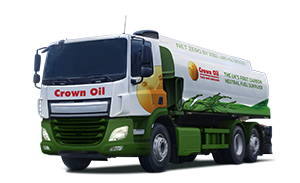Whatever Makes the World Go Round, Lubricants Keep it Spinning
Machinery and mechanical equipment of all types require lubrication to protect their components from the detrimental effects of friction. These lubricants are tailored to the job that needs doing and as such, there are several types.
Using the wrong product can damage your machinery and potentially void your warranty, so it’s good to know when to use grease and when use oils for lubrication. To help you know which lubricant is right for your business, Crown Oil has put together this guide to explain the various aspects of greases and lubricants that you need to know.

Grease, lubricating oil, lubricant – what’s the difference?
While there are many similarities between them, lubricating grease and lubricating oil are each a different type of lubricant. And although lubricants come as water-based, mineral oil-based (ie deriving from crude oil) and synthetic-based lubricants, at Crown Oil we supply mineral oil-based lubricants and greases, so we’ll focus on those.
Lubricating oils
As the name suggests, mineral oil-based grease and lubricants have similar structures, namely:
- A base oil with good all-round lubricating properties
- Additives specific to the oil’s function
What are the properties of lubricating oils?
The additives allow the lubricating oil to have properties that will enable the lubricant to function in the specific environment it will be put to work.
Among others, these properties will include:
- Low-temperature resistance
- High-temperature resistance
- Anti-wear
- Water resistance
- Oxidation resistance
Lubricating greases
Grease is a semi-solid lubricant that is produced with a base oil as well as extra additives to give it the properties it requires. Grease is an essential component of all aspects of engineering due to its defining property that when placed under shear, it behaves in a way that has approximately the same viscosity as the base oil used in the product.
What are the properties of lubricating greases?
- Base oil
- Additives (dependent on the grease’s use)
- Thickener
The addition of the thickener is what differentiates a lubricating oil from a lubricating grease. The thickening agent is useful as it forms a thick layer between moving parts, preventing wear and tear.
Grease shares the same additives as oil, however, it needs protection from it’s ‘dropping point’ – the upper temperature at which the grease retains its structure, after which it loses its plasticity and starts behaving more like an oil. This causes the grease to drip, causing a leak and requiring frequent re-lubrication.
Uses of lubricating greases and oils
There are a multitude of different lubricating oils and greases designed for all manner of different uses across a wide range of different industries. It would be difficult to list them all along with all of the different use cases for each and every one of them.
Here is a list of some applications and uses for both lubricating oils and greases:
Lubricating oils uses
- Moving mechanical parts
- Cars
- Factory machinery
- Hydraulics
Lubricating greases uses
- Bearings
- Gears
- Heavy-duty Machinery

How to choose between using a lubricating oil and a lubricating grease
While grease and oil have similarities and can be interchangeable, they have their own use cases and there are times when lubricating oil is preferable over grease and vice-versa.
Reasons to choose lubricating oils
- When you need heat transfer from the lubricant to the outside of the system
- When the machinery requires a central oil supply that can lubricate multiple parts of the machine at once
- To lubricate machinery that requires frequent, constant lubrication
- To lubricate components that move at high speeds
- To lubricate machine parts that are easily accessible.
Reasons to choose lubricating greases
- To ensure machines/components that are not in use all the time will be lubricated when they are needed
- To lubricate inaccessible parts as well as parts that are sealed for life, such as in gearboxes and other complex moving parts
- To lubricate machinery that moves at a low speed
- To lubricate machine parts that require operating at extreme conditions, such as high pressure, high temperature, under high load etc.
- To protect worn components and extend the life of parts previously lubricated by oil
When to use an oil or a grease for lubricating?
As you can see from the reasons for choosing both lubricating oils and greases, there are going to be times when one is more appropriate than the other. It’s not simply the case that one is any better than the other, but more a case that one is better suited to the job in hand.
Choose lubricating oil if you require:
- Low friction lubrication
- Under low strain
- Efficient heat transfer
- Constant lubrication
Choose lubricating grease if you need:
- To lubricate infrequently or as a one-off here and there
- A machine that is used infrequently to stay lubricated and be lubricated at short notice
- To lubricate components under extreme conditions
Specialised types of lubricants and greases for every use
Across various industries, there is a whole range of different lubricants, oils and greases that help to keep the various machines, engines, vehicles and more running at peak performance. Having access to the right lubricants is important to these businesses to keep everything running smoothly.
Here are just some of the uses for the lubricants that Crown Oil can supply:
- Agricultural lubricants – agricultural machinery leads a demanding life and these greases and lubricants are optimised for keeping your farm equipment running as you need it
- Automotive lubricants – ranging from transmission oil to crankcase lubricants, these lubrication oils enhance performance, reliability and durability by reducing the amount of friction and wear in the engine at both the cold start and during normal operating temperatures
- Commercial lubricants – Aimed at businesses, this range of lubricants is designed to help your commercial enterprise run smoothly
- Industrial lubricants – Our mechanical lubricants and mechanical greases are designed to reduce friction between metal parts
- Food grade lubricants – food processing requires greases and lubricants that are non-toxic and food-safe products that are National Sanitation Foundation (NSF) and InS registered (for H1, incidental contact with food applications). These lubricants may also need to meet Kosher, Pareve or Halal standards
- Hydraulic oil – Oils used in hydraulic systems are also lubricants. We’ve written up a guide to hydraulic oils if you would like to learn more
- Marine lubricants – These are optimised for use in the marine sector, so they offer high water resistance and high salt resistance
- Metalworking fluids – Crown Oil’s metalwork lubricants are designed to maximise sump life, reduce costs, and extend tool life while also improving the surface finish of your goods
Are you using your lubricants correctly?
When it comes to machine lubricants, using the right product for your equipment and machinery is key, but the method in which they are used is equally as important. Using lubricants properly will ensure your machinery benefits from a longer lifetime and reduced running costs.
Failing to implement proper lubrication management can negatively impact the performance of equipment, increase operational costs, or even force you to replace machinery. For tips on how to use your lubricants properly, read our eight rules to lubrication management, or speak to a member of the Crown Oil team today.
Want a lubricant health check?
Want to make sure your current lubrication solution is up to scratch? If so, we can send a technician to your site to determine if your lubricants are in good condition and recommend an alternative if necessary.
If you’re looking to buy lubricants and greases for just about any application or use, Crown Oil can supply whatever you need in any quantity including 205-litre barrels through to much larger bulk quantities of lubricants and greases. Call our lubricants experts today on 0330 123 1444 to learn more.





